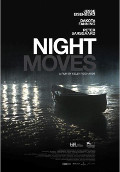
Directed by
Kelly Reichardt
112 minutes
Rated M
Reviewed by
Chris Thompson

Night Moves
Synopsis: Organic farm worker, Josh (Jesse Eisenberg), high society dropout, Dena (Dakota Fanning), and ex-Marine, Harmon (Peter Sarsgaard), plan and implement an act of eco-terrorism, blowing up a controversial Oregon dam. But when the reality of what they’ve done starts to hit home, the three environmental warriors find themselves immersed in doubt and paranoia arising from unintended consequences.
Early on in this eco-thriller from the director of Wendy and Lucy and Meek’s Cutoff, a group of environmentalists suitably bearded and attired in knitted beanies, are watching an eco-activist’s film being screened on a white bed-sheet strung up on a shed wall. At the end of the screening, in response to a question from the audience about how she thinks the environment can be saved, the filmmaker reveals that she has no faith in big plans; only in a lot of small plans. It’s one such small plan that brings Josh, Dena and Harmon together in an overt protest against the needless damming of an Oregon river.
As you would expect from a thriller, the first part of the film is devoted to the trio putting the plan together, taking great pains to remain untraceable in a world of internet and video surveillance. But pretty soon it becomes clear that this film is more interested in exploring the characters than it is in building the tension of the plot they’re hatching. Yes, there are moments when their plan might be discovered or when they might get caught, but these feel more pro forma than thrilling and, in most cases, the obstacles to their plan are relatively easily overcome. When Dee attempts to buy a large amount of fertiliser for their bomb, she is challenged by the feed store boss who demands identification for the controlled substance. When she suggests that he’d readily sell it to one of the old guys who are regular customers, he capitulates. It’s not quite an ‘edge of the seat’ moment.
Reichardt has said she wanted to tell a story that was ‘...not about politics but about people’ and therein lies the problem with her film. It feels that the political thriller we start with only exists to get us to its people. Yet it’s hard to feel satisfied with the film’s exploration of the personal moral angst when the consequences of their act seem not so surprising. When we hear the line, ‘...you promised no-one would get hurt’ you have to wonder at their naiveté in thinking they could commit such an act without collateral damage.
This underwhelming effect isn't helped by the overly internalised and de-energised performance from Eisenberg (as much as it seems to be his trademark). We understand the dilemmas he’s wrestling with and, to a certain extent can empathize with him, but too often they are portrayed by long, ponderous scenes of him standing in nature wrestling with his conscience, or lying on his bed staring at the skylight. Nevertheless, the guilt and self-recrimination that seeps into both Josh and Dena and the slow disintegration of the trust between the three conspirators provides an interesting study into the reality of what happens when well-meaning people do a bad thing in the name of a good cause. Night Moves is at its best when it confronts us with the question of how we feel about these home-grown terrorists who are acting in the name of a more palatable ideal such as saving of planet, as distinct from a more fundamentalist, religious viewpoint.
Still, and particularly because of the strength of her two previous efforts, it’s hard not to feel disappointed by how far short of the mark Reichardt’s film is as a thriller. And it’s equally difficult not feel that the pace of the human story is too plodding to fully engage us or that the non-ending is more of a let-down than it is provocative. In the end, Night Moves seems to be hedging its bet, and, for me at least, it’s a bet that doesn’t pay off.

Want more about this film?


Want something different?




